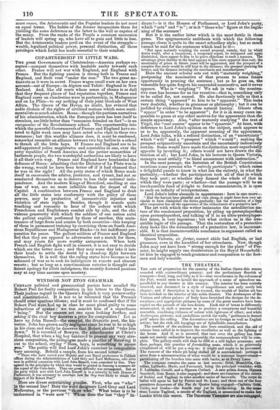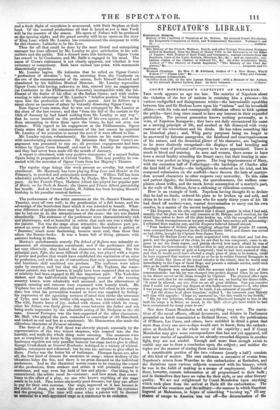TEE THEATRES.
THE note of preparation for the opening of the Italian Opera this season sounded with extraordinary potency; and -the preliminary flourish of trumpets—loud, long, and lofty as it is—that reverberates in the columns ef the Post, would seem to herald the approach of a scene of splendour un- paralleled in any theatre in this country. The interior has been entirely renewed, and decorated in a style of magnificence not only costly but elegant; and if description is to be trusted, the wealth of Italian art has been lavished on the interior of this noble theatre. The Arabesques of the Vatican and others palaces of Italy have furnished the designs for the de- corations; and appropriate pictures by some of the great masters have been copied on the ptumels of the box-fronts. Each tier of boxes is differently ornamented, in such a manner as to produce a sumptuous and beautiful ensemble, combining richness of colour with lightness of effect; and while Arabesques, pictures, and medallions enrich the walls, "goddesses in fretted gold" adorn the ceiling. The decorations are by foreign as well as English artists; but the rich silk hangings are of Spitalfields manufacture.
The comfort of the audience has also been considered, and the aid of science been called in to improve the ventilation as well as the lighting of the house. And if, as is asserted, that vast oven the gallery has been made not merely endurable but agreeable; the metamorphosis will be com- plete. The gallery-stalls will then be It1 at a still higher premium; and then, perhaps, this practice of forestalling seats, which is so grievously complained of, will be put a stop to: it might and ought to be prevented. The rumour of the whole pit being stalled off is contradicted: perhaps it arose from a misconstruction of what would be a welcome improvement— partitioning off the benches into seats with backs, as at Drury Lane.
The company remains the same as last season: Grisi, Brambilla, Cas- tellan, Lablache, Mario, and Fornasari, being the principal vocalists; with F. Lablaehe, Corelli, and a Signora Corbari. A new prima donna, Signora Sanchioli, from Rome, is also engaged; and there are rumours of the return of Rnbini and Taglioni to take another series of farewells. The corps de ballet will again be led by Perrot and St. Leon; and three out of the four premieres danseuses of the Pas de Quatre being engaged—Carlotta Grid, Cerito, and Gmhn—the fourth may yet be forthcoming. In the mean time, Louise Taglioni, a cousin of the Taglioni, is announced to make her London &bid this season. The Dauseuses Yiennoises are also rengaged ; and a fresh flight of coryphees is announced, with Petit Stephan at their head. Of the musical productions all that is heard as yet is that Verdi will be the maestro of the season. His opera of Nabuco will be produced on the opening night; and the grand novelty will be an opera on the story of King Lear, which Mr. Lumley has commissioned the composer to write for this theatre; Labladle to be the Lear.
Thus far all that could be done by the most liberal and enterprising manager has been effected by Mr. Lumley to give satisfaction to his sub- scribers and the public. But a discord mars this harmony. Signor Costa has ceased to be Conductor, and Mr. BaIfe is engaged in his stead. The cause of Costa's retirement is not clearly apparent, nor whether it was voluntary or compulsory. Both have rushed into print, with statements diametrically opposite. Mr. Lumley begins. He intimates that he relied on Signor Costa's "professions of devotion"; but, on returning from the Continent on the eve of the commencement of the season, finds himself deceived and abandoned by his faithless Musical Director. Mr. Lumley reproaches Signor Costa with having, unknown to him, entered into an engagement (as Conductor to the Philharmonic Concerts) incompatible with the ful- filment of the duties of his office at the Italian Opera; and with endea- vouring to take advantage of Mr. Lumley's "helpless position" by forcing upon him the production of the Signor's operas. And he follows up a taunt about an increase of salary by virtually dismissing Signor Costa.
Now Signor Costa states, that he was not reengaged by Mr. Lumley at the close of the last season; and that "from the fall of the curtain to the 15th of January he had hard nothing from Mr. Lumley in any way ": that he never insisted on the production of his own operas; and so far from attempting to force them upon the lessee, he had not even one written. With regard to his engagement at the Philharmonic, Signor Costa states that at the commencement of the last season he apprized Mr. Lumley of his intention to accept the post if it were offered to him.
Mr. Lumley rejoins, voluminously. He insists on his main assertions, with corroborating circumstances. He intimates that Signor Costa's en- gagement was presumed to run on: all previous engagements had been written by Signor Costa himself, and sent to Mr. Lumley for signature; and they had never been made till the month of January.
A report is circulated, with very positive statements, of a second Italian Opera being in preparation at Covent Garden. This may possibly be con- nected with the secession of Signor Costa from her Majesty's Theatre.



























 Previous page
Previous page